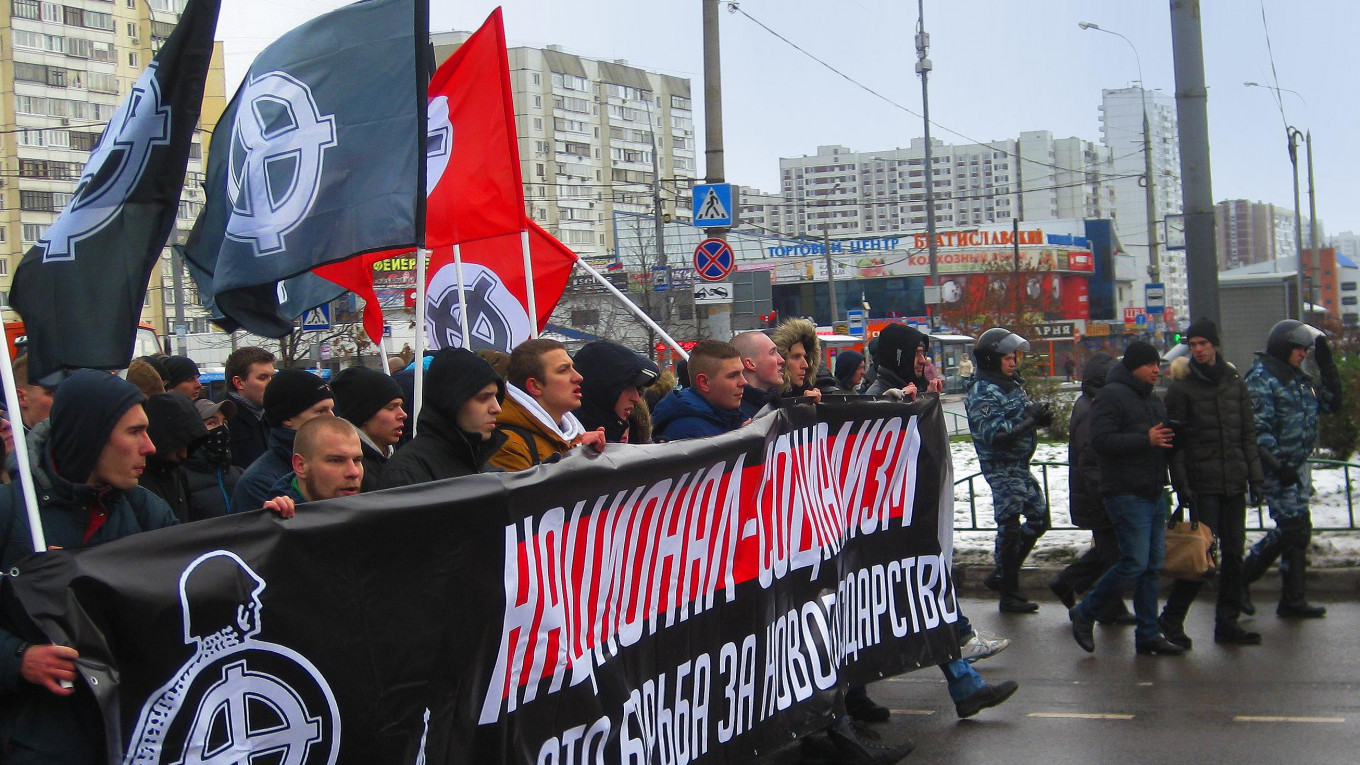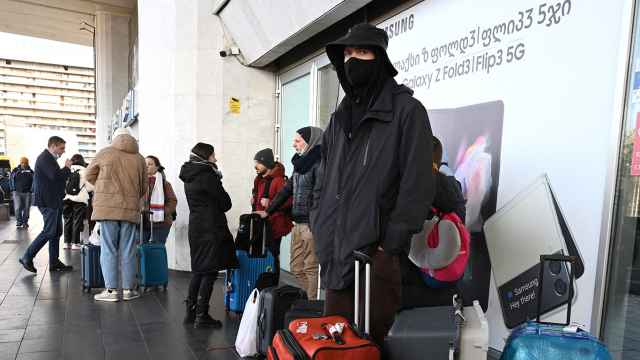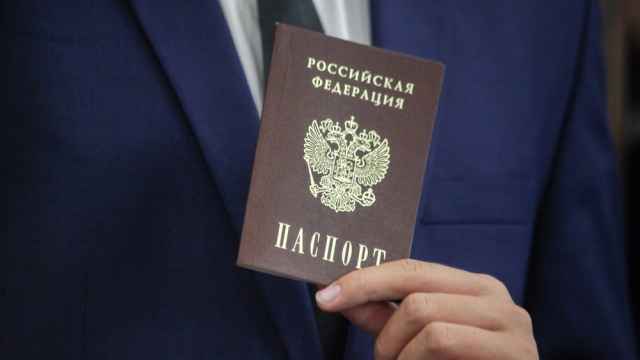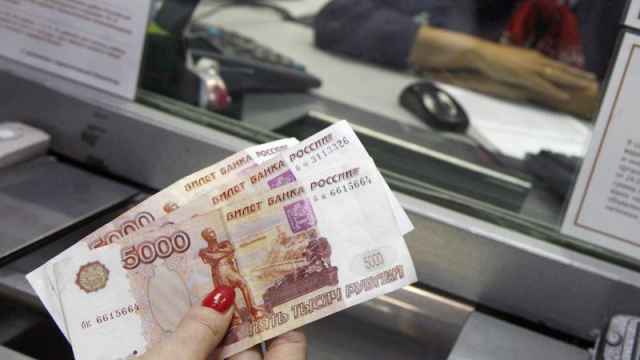On Friday, Nov. 4, chants rang out through the suburban neighborhood of Lyublino, in southeastern Moscow: “We are Russians! Glory to the Slavic nations! Glory to the white races!”
Soon, a crowd appeared on the horizon. Some of the men — for they were mostly men — bore Russian nationalist tricolors and banners emblazoned with the Kolovrat, a Slavic swastika. As they made their way down Ulitsa Pererva, guarded by an equally large crowd of police officers, the marchers shouted to demand the impeachment of President Vladimir Putin. Locals stood by, oblivious to what they were witnessing.
As some found out, this was the infamous Russian March, an annual motley gathering of the Russian far right. It should have been a major celebration for Russian nationalists of all stripes. But this time it didn’t seem that way. With only around 800 people in attendance, the 2016 march showcased a nationalist movement decimated by changing political realities.
Since Russia’s annexation of Crimea, pro-government patriotism has grown sharply, allowing the Kremlin to co- opt nationalist sentiment to their own tune. At the same time, the far right itself has split sharply over the Krem- lin’s support for pro-Russia separatists in Ukraine.
So this year, the main Russian March in Lyublino, which opposed the war in Ukraine, found they had competition across town — a smaller rally in support of the “Russian Spring.”
“Russia for the Russians!”
Russian ethnic nationalism emerged during the tumultuous years following the Soviet collapse, but only came into its own during the late 2000s. Labor migration from Central Asia was growing rapidly, and two Chechen wars had spread negative attitudes toward people from the North Caucasus region. As ethnic nationalists spoke out against illegal migration, they increasingly seemed to express the anger of ordinary Russians.
At its peak, Russian rightist nationalist movements received support from mainstream political figures. First to attend Russian marches were patriotic pro-government politicians like Dmitry Rogozin, now a hawkish deputy prime minister.
Then, in 2011, the anti-corruption activist and opposition darling Alexey Navalny took a central organizational role in the event. Nationalists were a significant part of the 2011 protest movement.
With Russia’s annexation of Crimea and the start of the war in the Donbass, however, any nascent nationalist unity collapsed. Suddenly, public attention reoriented itself on Ukraine and the Russian populace largely lost interest in the labor migration issue. Nationalists were unable to react decisively.
Some took the side of the Kremlin; others Ukraine. In the aftermath of the Ukrainian revolution, there were even violent clashes between different Russian nationalist factions.
Some nationalists decided to move the fight to Ukraine, and split along the same lines. Part travelled to fight with separatists in the unrecognized Donetsk and Luhansk people’s republics, while others joined pro-Ukrainian militias. Alexander Verkhovsky, director of the SOVA Center, estimates that several hundred fought with the separatists, while around 100 fought for Kiev.
This division still leaves a bitter taste in Yegor Prosvirnin’s mouth. A prominent nationalist and editor of Sputnik & Pogrom, a right wing news site, Prosvirnin has helped to direct volunteers to join the separatist ranks, fundraise, and send humanitarian aid to the Donbass. He has little tolerance for the other side.
“Those who supported Ukraine are Nazis, skinheads, and white racists,” he says. “Real Russian nationalists aren’t National Socialists. They don’t believe in one people’s full humanity and another’s half-humanity. They are focused on Russian national interests.”
But Yury Gorsky, a Russian nationalist with monarchist views who led the Lyublino Russian March, saw the war in Ukraine as “brothers killing brothers.”
“A Russian nationalist cannot accept that Ukrainian citizens with Russian last names are killing Russian citizens with Ukrainian last names,” he says. “We have the same roots.”
As the Ukraine conflict began, the Russian authorities also began to put greater pressure on the far right. In June 2014, the Duma passed a law criminalizing online support for extremist activities — making sharing or even liking extremist content on Facebook a jailable offense.
One by one, ethnic nationalists found themselves in trouble. In August, Russia sentenced nationalist leader Alexander Belov to 7.5 years in prison for embezzlement and extremism. This month, just days before the Rus- sian March, Russia placed Dmitry Dyomushkin, one of the march’s organizers, under house arrest due to extremism charges. According to SOVA Center research, convictions for online extremism increased from 103 in 2013 to 216 in 2015.
But perhaps the bigger problem was that the far right had found itself in direct competition with state nation- alism.
“There was only going to be one winner in this compe- tition,” says Verkhovsky.
Filling the Gap
Russia’s new state-sanctioned nationalism mixed patrio- tism, great power might, and hostility to the West.
One of its leading proponents was the National Liberation Movement (NOD), a nationalist group determined to fight Russia’s “enemies from within.” Founded in 2011 by ultra-patriotic Duma deputy Yevgeny Fyodorov, NOD aggressively protested against Russia’s perceived enemies: the U.S. Embassy, opposition politicians, artists criticizing state censorship, and even foreign audit firms working in Russia.
NOD pushes to repeal laws that limit the power of Putin — laws which Fyodorov says were drafted by the United States. It rails against a “fifth column” in the Russian gov- ernment. A recent copy of NOD’s newsletter claims that when Putin left the Federal Security Service (FSB) to become Russia’s prime-minister in 1999, he told his FSB col- leagues, “The first step of our operation to infiltrate the criminal gang” — i.e. Russia’s government — “is complete. Now I begin the second step: liquidating the gang.”
Outlandish anti-Western rhetoric makes it easy to write NOD off as a cartoonish group of political rabble-rousers. But NOD is far from an outsider organization. Fyodorov, its leader, is one of the longest-serving Duma deputies, and NOD can sometimes get its initiatives onto the government agenda.
Additionally, the movement claims to have more than 260,000 registered activists across Russia and even branches in other countries. And its popularity is only growing, according to Maria Katasonova, a prominent NOD activist.
“In the 1990s, it was shameful to be Russian,” Katasonova says. “Now Russians have something to believe in. The myth that everything is wonderful in the West is starting to break down. People are returning to their roots.”
Unclear Future
Amid growing state patriotism, the unsanctioned far-right doesn’t look to have a bright future. It remains divided over Ukraine, and fragmented by infighting. Since the glory days, when nationalists joined the ranks of the Donbass separatists, many nationalists have left the region — because of Kremlin pressure, according to Prosvirnin. Those nationalists who fought for the Ukrainian side cannot return home to Russia.
And Russia’s economic crisis, combined with new laws making it easier to keep labor migrants out, will likely limit the appeal of the nationalists’ old anti-migration platform.
Putin’s Oct. 31 announcement that he supports the creation of a new law defining the Russian civic nation suggests that the authorities are hardly willing to make ethnic Russian nationalism a central part of their platform. Naturally, this move was not well-received by nationalists.
Anton Shekhovtsov, a visiting fellow at the Institute for Human Sciences in Vienna, Austria, predicts neither destruction, nor rebirth for the Russian far right. Instead, he believes that the Russian government will continue to use an old strategy against nationalists: co-opting those who it can integrate into the political system, while suppressing the rest.
“The Kremlin needs some charismatic people that they can integrate into the system, but they have to be loyal,” he says.
For committed nationalists like Prosvirnin and Gorsky, who hold polar opposite views on the situation in Ukraine, loyalty to the government appears out of the question.
“Putin and the Kremlin broke off relations with 120 million ethnic Russians,” Prosvirnin says. “When you ignore an entire nation, it is the highest form of hostility.”
Gorsky couldn’t agree more. He believes efforts to suppress the far right will only make his movement stronger.
“Russian nationalism is the immunity of the Russian nation," he says.
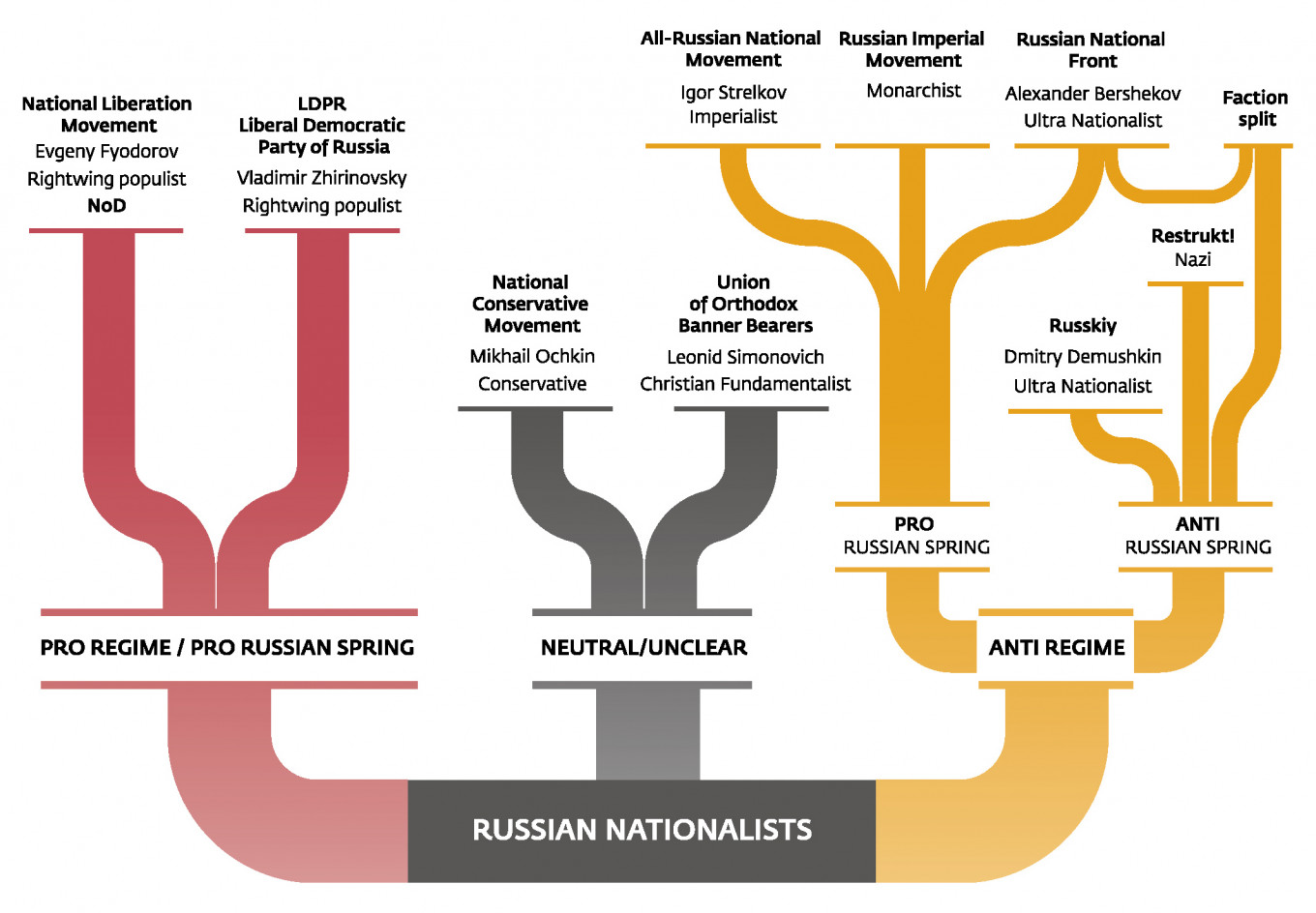
A Message from The Moscow Times:
Dear readers,
We are facing unprecedented challenges. Russia's Prosecutor General's Office has designated The Moscow Times as an "undesirable" organization, criminalizing our work and putting our staff at risk of prosecution. This follows our earlier unjust labeling as a "foreign agent."
These actions are direct attempts to silence independent journalism in Russia. The authorities claim our work "discredits the decisions of the Russian leadership." We see things differently: we strive to provide accurate, unbiased reporting on Russia.
We, the journalists of The Moscow Times, refuse to be silenced. But to continue our work, we need your help.
Your support, no matter how small, makes a world of difference. If you can, please support us monthly starting from just $2. It's quick to set up, and every contribution makes a significant impact.
By supporting The Moscow Times, you're defending open, independent journalism in the face of repression. Thank you for standing with us.
Remind me later.


